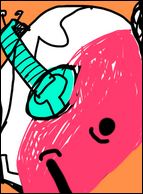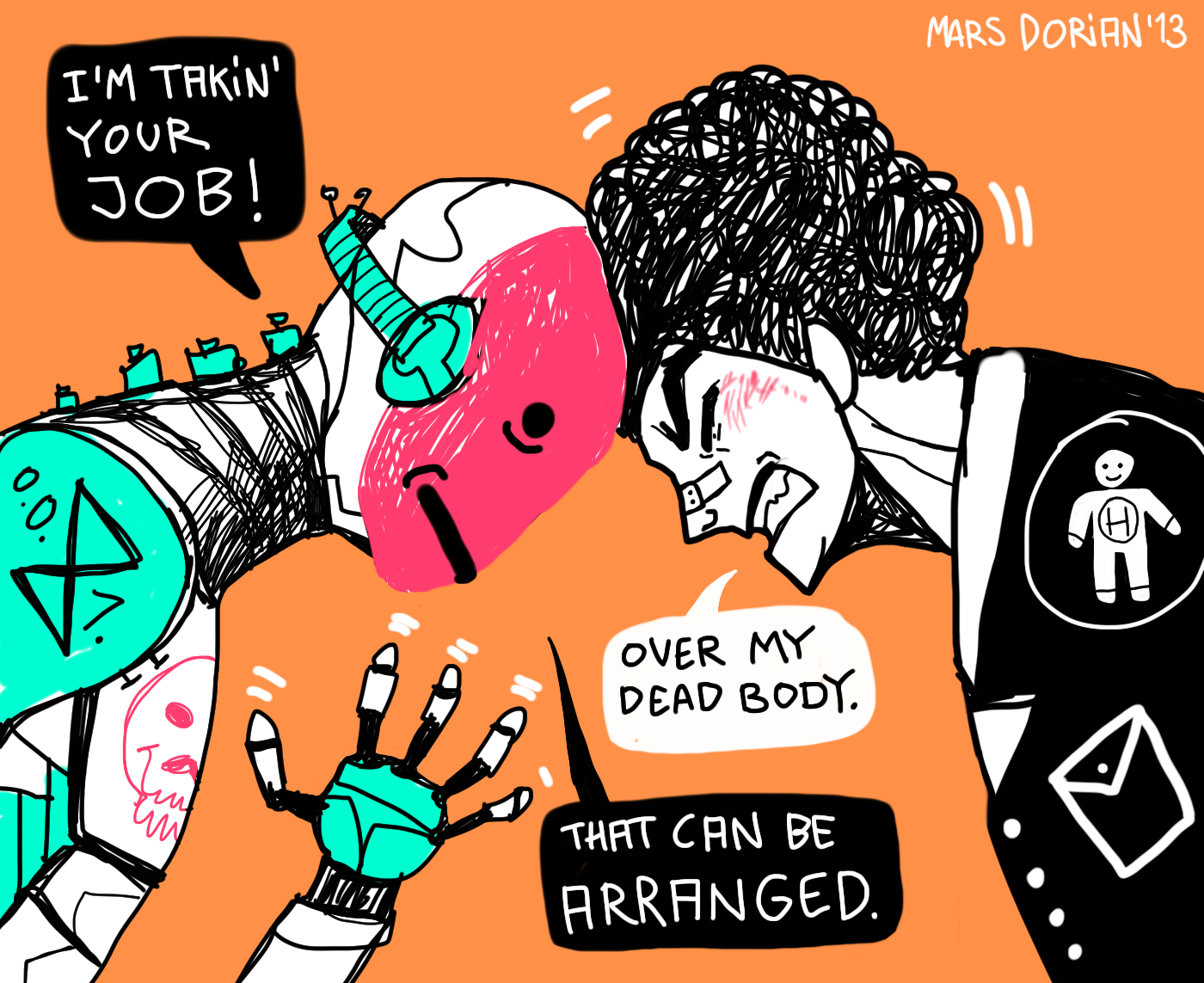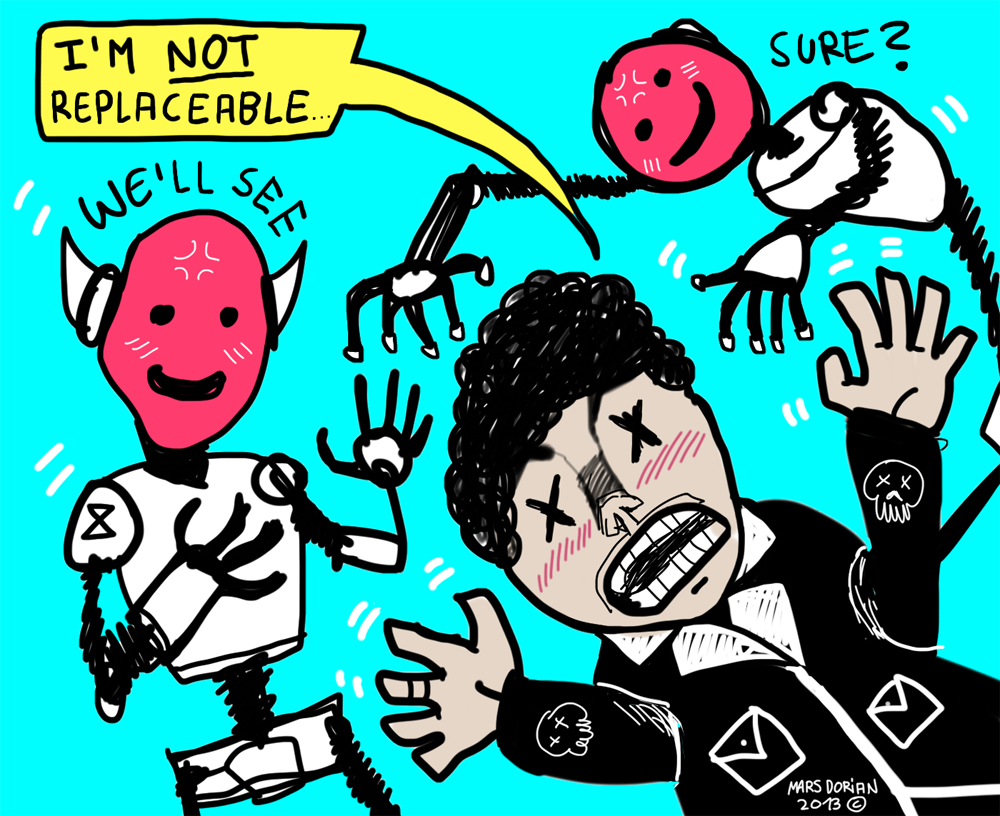By Mars Dorian, Contributing {grow} Columnist
This headline may seem like a hoax, but I assure you, it’s not.
We all know the times are changin’, but most of us don’t realize what those changes mean to YOU and your career. We also know that competition is on steroids in the online age, but most of us think only about human competition. But it’s not humans you have to rival, but artificial agents, also known as robots.
Heh.
I can read your thoughts already – yeah, yeah, that’s some fun sci-fi you gobbled up there, but that won’t replace ME because I’m unique / incomparable / one of kind / or whatever one gloriously thinks of her/himself.
Impossible? Let’s look at where technology is today:
- Google launched the driverless car. In the near future, you may not need a driver’s license because you’ll never have to drive again. The car is first on the automation control list, ships and aircraft will be next. Wait for it.
- Philip M. Parker, a professor of management science in France received worldwide coverage. Why? Well, he used a robotic algorithm to write and upload over 200,000 (!) eBooks to Amazon. Talking about prolific writing. Granted, it’s not Shakespeare yet, but if a robot can already write correct reports, how long till they create your content marketing plan?
- According to this short CBS documentary about robotization, we’re beginning to see robots (yeah, real robots) entering the workforce. The short feature includes two renowned MIT professors who predict that robots will completely replace every job known to mankind by the beginning of the next century.
- In this three-part series from The Associated Press, experts warn that if you add up all the jobs that technology (like robots) can take, the world is going to see unemployment on a scale that we haven’t begun to imagine. The article quotes software entrepreneur Martin Ford, who foresees a computer-dominated economy with 75 percent unemployment before the end of this century, and questions whether human beings will have anything left to do as robot and computers get smarter.
Boom.
Still think you’re irreplaceable? That’s also what horse sellers thought when Henry Ford introduced the first affordable automobile to the general public. They probably laughed their hooves off.
Yeah, I think we all know how that story ended.
Listen – technology has already put a death strike on many businesses- especially the traditional media. Book publishers and newspapers have to face extinction if they don’t adapt. But it’s not just the big corporations that have to adapt, you have to, too.
The more replaceable and “mediocre” your service and offer, the easier and faster you will be replaced by an algorithm / app / software that does the job better than you at a fraction of your cost.
But hey, I don’t want to paint the future black. There’s a lot of opportunity before the robots (mis)use us as human batteries and trap our minds in a virtual reality version. What other people see as crisis I see as opportunity. (BTW – the Chinese symbol for “crisis” consists of the signs “danger” and “opportunity,” and I want to focus on the opportunity part.)
If more and more of our work can become replaceable, what can you do to stay relevant?
Here are my top tips that I obsessively follow myself:
Define your edge and go there.
 If you create work that’s easy to replicate, you will attract copycats. And if a human can copy your style / tactic / method, so can a robot algorithm. Bad for business. Baaad for you.
If you create work that’s easy to replicate, you will attract copycats. And if a human can copy your style / tactic / method, so can a robot algorithm. Bad for business. Baaad for you.
You want to make it challenging to replicate the value you give, and that’s why you have to go the edges your competition isn’t willing to approach. You should do something extreme with your biz that makes it stand out. I for example will include more and more images and graphics into my online presence – creating a color-bombed visual marketing blog experience you haven’t seen before.
I believe: Over-the-top in your market shouldn’t be a one time thing, it should be your mantra.
Creating caring connections.
 Business is made of humans. No matter how technical it gets, it’s still about humans serving other human beings, at least in this century.
Business is made of humans. No matter how technical it gets, it’s still about humans serving other human beings, at least in this century.
Your network is your only job security – the more and better you’re connected with people from around the globe, the more opportunities will arise. I currently get 70% of my work through referrals and recommendations. Am I the only one that can solve their problems? No. But because they know me through a common friend they trust, they automatically trust me. And trust can lead to collaboration. Eventually.
If you offer value with your service and you create heartfelt connections, word-of-mouth will bring you work. No robots required.
Make art and change your client’s life.
 Making art is the opposite of creating a commodity. That’s why bowling is so boring – it’s limited by a perfect score people can reach, which means getting good at it is no big value. Not so with “art.”
Making art is the opposite of creating a commodity. That’s why bowling is so boring – it’s limited by a perfect score people can reach, which means getting good at it is no big value. Not so with “art.”
In essence, making “art” means creating value that’s hard to put a number on. You can feel it, but you can’t compare it. It’s unique.
You’re touching a human (and remember, all business is still about humans ) in a way s/he hasn’t been touched before. And I don’t mean in the dirty sense.
It can be your personality, your enchanting customer service or something else that only YOU can bring to the table. Drop the corporate speech. Lose the artificiality. Infuse the human touch. And when you make customers emotionally glued to you, there’s no need to fear a C3PO taking away your job. At least for now.
Conclusion:
The robot revolution won’t come in the form of Terminators with German-Austrian accents that annihilate you. Noooo. It will quietly creep into your life, eventually replacing you if you’re unwilling to adapt and make your work emotionally-essential. Maybe it’s already happening. Prove that you’re human and make “art” work that only you can make.
What do you think?
 Mars Dorian describes himself as a creative marketeer with a moon-melting passion for human potential and technology. You can follow his adventures at www.marsdorian.com/
Mars Dorian describes himself as a creative marketeer with a moon-melting passion for human potential and technology. You can follow his adventures at www.marsdorian.com/
Original illustrations by the author.




